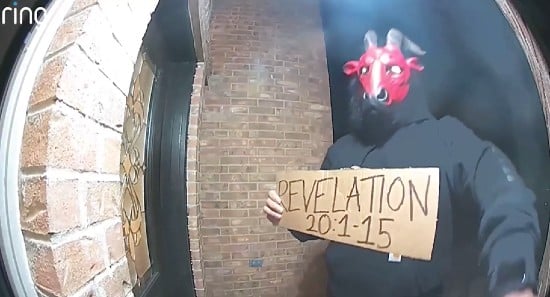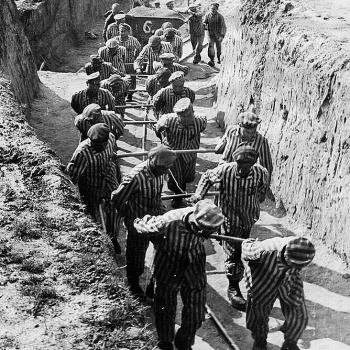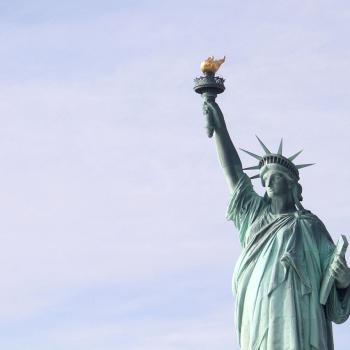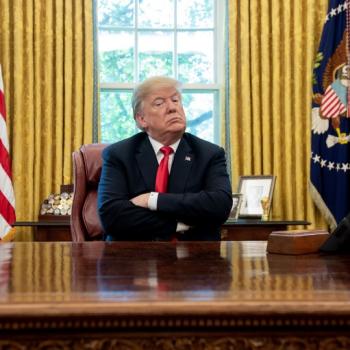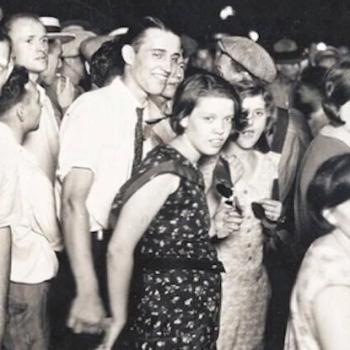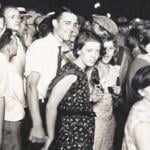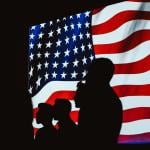• “When I saw that, I was like, ‘Uh, what’s the message here?’”
That’s a neighbor reacting to this: “Neighborhood camera shows man wearing satanic mask approaching homes with Bible verse.”
People in a north Texas neighborhood were frightened by a man wearing a satanic mask while carrying a sign depicting the apocalypse.
The stranger was captured on a family’s doorbell and driveway cameras Saturday night, drawing concern from residents like Scott Geairn.
“When I saw that, I was like, ‘Uh, what’s the message here?’” he said.
Neighbors in the Carrollton community were left wondering if it was a prank or a prophecy.
… The unknown man wearing the unsettling mask was holding a sign which read “Revelation 20 verse 1 through 15.”
The referenced Bible passages depict an apocalypse in Christianity and Eternal judgment, where followers ascend to Heaven and the condemned are thrown into a lake of fire.
“I was a little rattled that night, I will say,” Geairn said.
The man did not just approach the front door of the family’s home, he also walked behind the home and stood in front of a driveway camera.
The homeowners, who remained unidentified, filed a police report after the incident. They said they have lived at their home for decades and do not know who the person is or what their message might mean.
I’m disappointed in the prankster here for the selection of this passage from Revelation. If you’re aiming for something baffling and absurdist, then you need a passage that’s shorter and more cryptic. If it’s just meant to be a joke, then you go with Revelation 3:20 (the verse in the title of this post). But if the prankster was trying to creep people out and unsettle them, then Revelation is full of much more promising stuff.
The combination of a “Satan” mask and a Bible reference describing the ultimate failure and demise of Satan just seems incoherent and contradictory, not portentous or provocative. Revelation 20:7-8 would’ve worked with that mask. The full chapter just doesn’t.
Anyway, the local news story above got the tone of its coverage right here — quirky news-of-the-weird, not actual hard news. Contrast that with the Satanic Panic spin from the nutters at Charismanews: “Satanic Mask-Wearing Stranger and the Spiritual Decline of America.”
We’re on track for another spike in Satanic Panic hysteria, primed for another conservative-tide peak like we experienced during the Reagan ’80s and with Q-Anon fever in the first Trump term. The language of this — “panic,” “hysteria” — suggests it’s driven by some genuine fear, but the primary driver of this panic is not fear, but guilt. The need to invent and obsess over a superlatively evil Other People comes from the troubled conscience of knowing — semi-consciously, perhaps, but still knowing — that you are complicit in and supportive of cruel injustice and indefensible behavior.
• This interview with Richard Carwardine on his new book Religious Strife: How Warring Religious Nationalists Forged Lincoln’s Union, serves as enough of a pretext to link again to one of my favorite primary sources on Lincoln: A Fireside Chat.
The post at that link is copied from a biography of 19th-century Baptist missionary and abolitionist Nathaniel Brown. He was part of a trio of Baptist clergy who knocked on the White House door and met with President Abraham Lincoln on the night before the Emancipation Proclamation was issued.
The excerpt at the post is from Brown’s personal notes of that meeting. The earnest pastors aren’t sure what to make of the ironic president, who confuses and teases them as much as he charms them. Carwardine speaks of Lincoln’s “providentialist turn” toward seeing God as more of “an active force in history.” That’s what the preachers argued when they met with the president, but Brown says Lincoln argued the opposite view in this conversation, and Brown feared he won the argument:
The President said all his convictions and feelings were against slavery. “But,”? said he, “I am not so certain that God’s views and feelings in respect to it are the same as mine. If his feelings were like mine, how could he have permitted it to remain so long? I am obliged to believe that God may not, after all, look upon it in the same light as I do.”
• Speaking of Baptist pastors, John Carpenter is the pastor of Covenant Reformed Baptist Church in Virginia. He and I are both Baptists, but beyond that we likely don’t agree on much of anything. Yet I appreciate what he’s trying to wrestle with here in his recent essay on white evangelicals’ “Racial Obtuseness.”
Carpenter struggles, I think, because he’s up against his own Reformed beliefs. Reformed/Calvinist theology says we are all sinners, lost and bound in sinfulness apart from the saving grace of God. Reformed theology rejects Catholic notions like “invincible ignorance” as based on a false premise of basic human innocence. So Carpenter’s efforts here to establish a more innocently ignorant category of “racial obtuseness” as distinct from the volitional sin of racism is weirdly un-Reformed.
The idea that sin is only sinful if it is deliberately, intentionally chosen by a discreet act motivated by animus just seems, well, not very Reformed. It’s also just a deeply weird argument: You are a depraved sinner, incapable of choosing obedience, incapable of choosing the good, and wholly deserving to suffer an eternity of conscious torment as just punishment for your deeds and your very nature — but also, obviously, you’re not racist. It’s really unfair of anyone to accuse you of that. You absolutely deserve an eternity in Hell, but it’s totally rude for those people to malign you by suggesting you’re guilty of that sin.
So much of that post keeps bringing me back to James Baldwin: “It is the innocence which constitutes the crime.”
But for all of that, this passage from Carpenter’s essay is quite insightful. This’ll preach:
[My father] explained that, though raised in that typically racist Southern atmosphere, when he was in the US Air Force, he learned to treat and regard black people as equals. It didn’t matter if a man was black or white, if he had a superior rank to you, you had to salute and follow orders; if he had an inferior rank to you, you couldn’t cause divisions by showing favoritism to some subordinates over others. It was the US military that taught my father not to be racist. And that’s a good thing. But think what that means. Why was it not the church that confronted and changed that racism? After all, my father and my grandmother regularly went to the Baptist church in their town. Why was it, year after year, that that Baptist church never challenged the idea that there were some neighbors they didn’t have to love as themselves? When visiting my grandparents we went to their church; I remember shaking the pastor’s hand as we left the building. Why didn’t that pastor and the rest of that church ever confront them about this problem the way the military did? Why was it that the US Air Force had the conviction and courage to change what a Baptist church would not?


